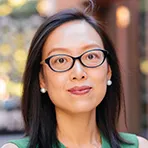MSx student Jing Lin says that she began her career as a medtech investor with a mission in mind.
“I was born an only child in Xiamen, China, but my dad has nine siblings, and my mom has ten, so I grew up in a big family, with girls being the majority,” says the co-founder of KOFA Healthcare, an evergreen family office venture fund supporting healthcare innovations. “Chinese culture prefers sons over daughters. But my mom is a tough lady, and would fight for me, and always told me that girls are just as good as boys — even when some relatives doubted the prospect of raising a girl.”
It’s no coincidence that her investment fund now focuses on innovators in women’s healthcare.
So where does your competitiveness and resilience come from?
I thank my childhood experience for my personality. I always had grit and determination to stand out, make myself proud, and make my family and parents proud. My parents always believed in me and allowed me to explore what I am curious about, and they have been an incredible support system. Whenever I considered an adventure, my parents would say, “Go for it, and if it fails, you can always go back to Xiamen/home.”
At KOFA, you invest in groundbreaking technologies that address critical unmet needs. What do you consider the most critical unmet need in healthcare?
The challenge is the gap between innovation and market needs, and investors play an instrumental role in bridging the clinical needs with the innovators. I started off investing in orthopedics and sports medicine and have added women’s health as well. Giving birth to my two daughters really inspired me to focus on women’s health, which is under-researched, under-served, and under-appreciated. When we started, few funds invested in women’s healthcare.
What’s a specific technology KOFA has supported that’s aimed at one of those unmet needs?
Very early on, we invested in Alydia Health, which was later acquired by a spinoff from Merck. They make the JADA System, which provides control and treatment of postpartum hemorrhage. I met the technical founder and CEO and was impressed by their journey.
Are there other reasons you’ve made women’s health a priority?
I’m a female investor, and men dominate venture capital. If I’m attending investor calls or board meetings, many times I’m the only woman sitting at the table. I’m less sensitive to the dynamic because I was born and raised in China, but you do notice the dynamic. So someone has to do the work, and I’m happy to be one of the few that invests in women’s health.
You’re also investing heavily in cardiovascular care. Why?
There are not many women’s health startups, so we have to adopt a broader definition of women’s health instead of focusing on problems that only affect women. So we include in our search scope problems that predominantly affect women, like the need for cardiovascular care. One reason I came to Stanford is I want to explore the application of AI in healthcare and medical devices in particular, because I feel we have a once-in-a-lifetime opportunity to support and witness the paradigm shift. I’m eager to see what’s out there.
Do you have an overarching philosophy about KOFA’s investment strategy?
We don’t want to invest in incremental changes and innovations. We like to invest in one-of-a-kind ideas where there is no other alternative. For example, we have a portfolio company that is addressing pulmonary hypertension. There may be ten pharmaceutical products out there, but there is no device. This is the only device addressing pulmonary hypertension. We also invest in a drug and device combo treating abdominal aortic aneurysms. It can potentially improve the lives of patients who currently don’t have any proven treatment options. I tell people that to invest in healthcare, you’ve got to invest with a mission. If you just invest for returns, you probably won’t choose healthcare. Going through the regulatory process to commercialization takes a long time.
Have your goals evolved during your time at GSB?
The plan has always been to go back to KOFA. I’ve always wanted to learn how to support entrepreneurs and better identify investment opportunities. I’m learning and fortunate to have had the support of mentors and advisors along the way. But it was time for me to formalize that in an institutionalized way. And there is no other place like Stanford GSB.
Your resume lists your interest in meticulous painting and calligraphy. Is that what you do to relax?
I started painting when I was a child. Sometimes, one meticulous painting would take months, making it a test of patience and delayed satisfaction. I’m a very detailed person, and I had to remind myself to step back and look at the big picture. That resonates with VC investors. You don’t invest today and think about getting a return tomorrow. It sometimes takes 10 years to see an exit.
Have any particular classes at the GSB made an outsize impact on you?
I’ve enjoyed every class, even core ones such as accounting and finance. One elective this semester is a VC finance course taught by Professor Ilya Strebulaev. He’s a legend in the field. The best part is that you’re not just learning from an academic perspective; we also have practitioners from pretty big VC funds. So you get the best of both worlds.
Photos by Elena Zhukova


